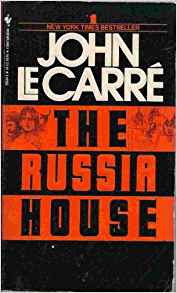Alfred
A. Knopf Limited, 1989
Whenever
I read a novel by John le Carré, I am reminded that the distinction
between genre and literary fiction is totally artificial. Le Carré
is renowned for his long career as an author of “spy fiction”.
However, every one of his books bears the marks of serious
literature: fluid, precise and evocative prose; vivid, complex
characterization; innovative narrative structures; and perhaps most
important, attention to serious themes. Few authors explore the moral
ambiguities of politics and society as acutely as le Carré.
Furthermore, he demonstrates how these thorny issues ultimately arise
from individuals, their choices and their behavior, though always in
the context of the institutions to which those people are bound.
The
Russia House was written and published during the years of
perestroika, when the Berlin wall was crumbling and the Cold
War appeared to be in a state of thaw. I expect that its insights and
its irony seemed particularly cogent at that time, but even now, the
novel retains its impact. In fact, in this era of polarization, fake
news and manipulated identities, it seems almost prescient.
The
story centers on British publisher Scott Blair, aka “Barley”, who
in mid-life is a brilliant, charming, well-educated failure. Barley’s
long history of drunkenness, indebtedness, broken marriages and
broken promises has led him to flee England and take refuge with his
latest lady-friend in Lisbon.
Kept
on a short rein by the aunts who bankroll his publishing company,
Barley has been a frequent visitor to Russia. The West is eager to
strike deals there, in the new spirit of cooperation and openness,
translating Russian gems as well as pushing previously unavailable
English books. On one of his Russian jaunts, at a vodka-soaked
gathering of authors and intelligentsia, Barley has a lengthy, late
night conversation with a remarkable man calling himself Goethe.
Although Goethe’s intellect and passion deeply impress him, Barley
more or less forgets the encounter until the British spy agency
ferrets him out and forces him into service.
It
appears that Goethe is actually a top Russian scientist, who has
written a critical book exposing the incompetence and fraud in the
Soviet nuclear missile program. But in spycraft, nothing is ever as
“it appears”. The explosive revelations and technical detail in
Goethe’s book could fundamentally change the balance of
power—increasing the chances of peace, or of war, depending on whom
you talk to. The government and its minions need to know whether the
material is genuine or a hoax designed to undermine the readiness of
the West. Goethe trusts only Barley—he directed his manuscript to
Barley, urging him to publish it, and it’s only by accident that
the book ends up in the hands of the authorities. Hence Barley,
mercurial, shiftless, tortured by inner demons, must be trained in
espionage and sent to meet the reticent author.
This
skeleton of the plot omits many complexities and a number of
important characters, all of whom le Carré sketches with a deft,
sure hand. In particular, there’s the shadowy figure of Palfrey,
legal advisor to the British spooks, who acts as the almost invisible
narrator for the novel. Palfrey sees himself mirrored in Barley; he’s
the silent, conflicted observer who always takes the easy way out.
Unlike Barley, he does not achieve redemption.
Then
there’s Katya, Goethe’s one-time lover, who is serves as the
conduit to the reclusive scientist. I will allow readers to discover
her on their own.
I
was struck, as I often am in reading le Carré, by the absence of
rapid action, violent confrontations and feats of derring-do so
prominent in modern spy thrillers. As Palfrey notes, “spying is
waiting”, and spycraft is far more of an intellectual than a
physical exercise. There’s violence in this book, but it’s hidden
in overtly civil conversations. In particular, a scene in which the
American CIA (who seize control of the operation from the more
civilized Brits) administers a polygraph test to Barley made me
shudder. (I am certain that was the author’s intention.)
One
of the delights in this book is the author’s rich portrayal of
Russia and the Russian people. As they deal with shortages, crumbling
infrastructure, corruption and fear of State repression, they remain
resourceful, brave, warm-hearted and sociable—even idealistic. It’s
clear that le Carré has deep knowledge of, and abiding love for,
Russia. The British characters fare more poorly, and the Americans
worst of all.
I
greatly enjoyed this book. It also filled me with new admiration for
its author. It’s far more than just a throwaway piece of genre
fiction.
I
would really love to see John le Carré get the respect he deserves.

1 comment:
I love le Carré best in the spy genre and have read just about every book - well, most of them. At the moment I'm reading The Honourable Schoolboy(very slowly indeed since almost two months, mainly because it's set partly in Hong Kong, another place on our beautiful earth that I've stayed at and loved!
With a le Carré, I know I'm going to read the kind of English I understand!
Post a Comment
Let me know your thoughts! (And if you're having trouble commenting, try enabling third-party cookies in your browser...)